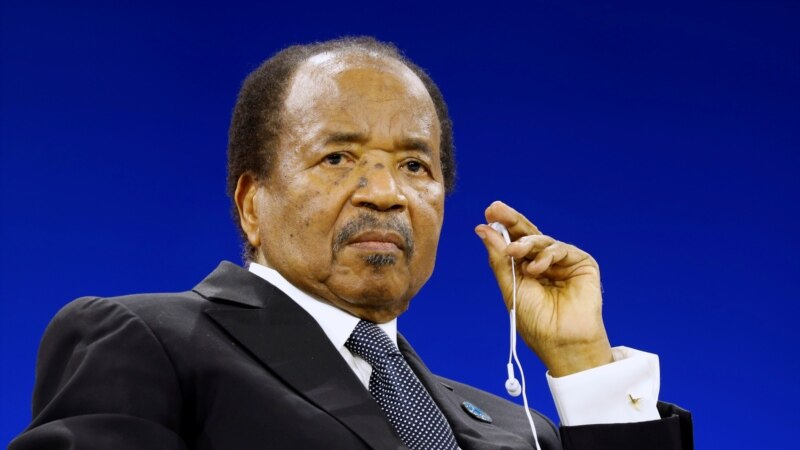Cameroon opposition, civil society condemn government threats toward Biya opponents

Yaounde — Condemnation is widespread in Cameroon following government threats to arrest civilians who criticize the country’s president. The threats increased after Cameroon’s political opposition accused President Paul Biya of postponing elections. In a release Tuesday, Human Rights Watch described the threats as censorship of free speech.
Cameroon’s opposition says it is not intimidated by threats from officials who are warning them to stop saying negative things about President Biya.
This week, government spokesperson Rene Emmanuel Sadi said it was unacceptable for people to use irreverent language about the 91-year-old president.
Before Sadi’s statement, Emmanuel Mariel Djikdent, a top local government officer in the unit where Yaounde is located, announced he would expel anyone from the capital who insults Biya or state institutions.
On Tuesday, Human Rights Watch said Djikdent’s announcement should be revoked to ensure the right to freedom of expression. The rights group says it is becoming increasingly difficult to speak freely in Cameroon.
Paul Atanga Nji, Cameroon’s territorial administration minister, says he is surprised that the opposition criticizes Biya, whom he says is the architect of Cameroon's democracy.
Nji says democracy given to Cameroonians freely by Biya must be constructively used to build and not to destroy. He says all government and administrative officials should be firm in punishing opposition and civil society members why defy and insult state authority.
Nji told state TV on Tuesday that opposition parties that call for protests against state officials will be arrested for rebellion, insurrection and treason.
Cameron's opposition accuses Biya of ruling with an iron fist and says he is not showing signs he is ready to relinquish power.
Ndah Grimbald, assistant secretary-general of the opposition Social Democratic Front Party, says Biya should emulate the example of U.S. President Joe Biden and hand over leadership to a dynamic civilian.
"Our president, Paul Biya, is 10 years older than Biden. He is 91 years [old] and instead of thinking [of] how to hand over power to the younger generation, his regime is doing everything to impede the rights, the fundamental rights of Cameroonians from assembling and discussing the affairs of their country," said Grimbald.
Supporters of Biya say he is a democrat and has won all elections since the return of multiparty politics in Cameroon in 1990.
Biya has not said if he will be a candidate in the next presidential polls, but his party supporters have been organizing regular political rallies to urge him to run for re-election.
Opposition groups were angered earlier this month when Biya ordered his majority Cameroon People's Democratic Movement or CPDM party to pass a government bill extending terms for all 180 lawmakers by 12 months, into 2026.
The law makes it hard for main opposition leaders, including Maurice Kamto, to gain the legislative seats they need to be eligible to run against Biya in the next presidential election.
Kamto says he won the 2018 presidential election but lost it to Biya through fraud. Kamto then boycotted Cameroon's 2020 local council and parliamentary elections.
Cameroon’s laws make it possible for presidential aspirants who do not have legislative seats to submit 300 signatures from influential politicians, including former ministers, traditional rulers and religious leaders, to secure a spot on the presidential ballot.
But the opposition and civil society say getting the signatures is highly difficult because the leaders are either scared of Biya or are his political partners.
Biya is Africa's second-longest serving leader after the president of Equatorial Guinea, Teodoro Obiang Nguema, who has been in power since 1979.
